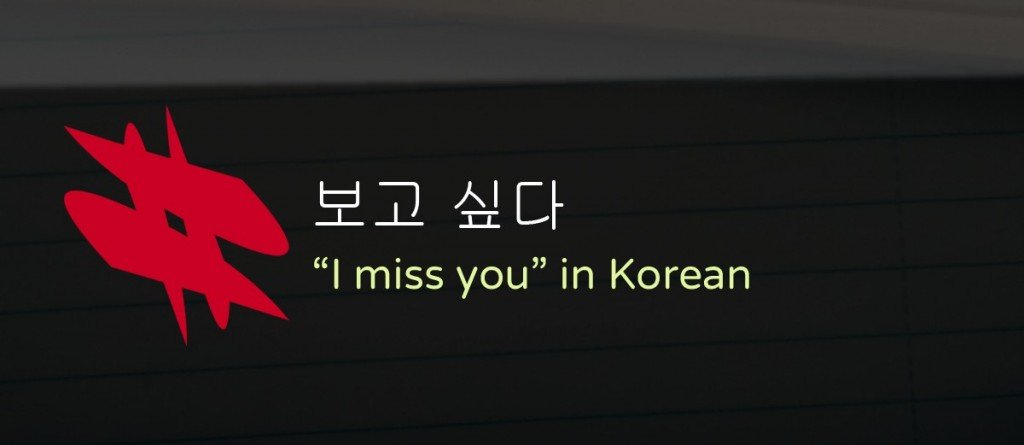보고 싶다 – How to Say I Miss You in Korean

So let’s take a look at how to say I miss you in Korean. The most common way is to say bogoshipo (보고 싶어) and if you want to make it more polite you can say bogoshipoyo (보고 싶어요). But how would I know when to use one or the other? It’s time for a closer look!
bogoshipo (informal)
(in Hangul: 보고 싶어)
This is the casual, informal way of saying “I miss you” in Korean and most likely the one you will want to use. Literally, you’re saying “I want to see you” but the practical meaning is still “I miss you.” If this is all you want to know about this expression, now would be a good time for you to learn some appropriate phrases to use with your girlfriend or boyfriend! Keep in mind that in Korean, you don’t need to say “I” or “you” if it’s clear who you’re talking about. Perfect to say to your boyfriend or girlfriend when you miss them! You can also use with your close friends and siblings. For other people, you should use:
bogoshipoyo (polite)
(in Hangul: 보고 싶어요)
This is the more polite way of saying “I miss you.” Use this with people that you’re not close friends with and who are older than you or of higher status. And just in case you feel like going full-on formal on someone, you can use:
bogoshipsumnida (formal)
(in Hangul: 보고 싶습니다)
Considering the nature of the word in this context, I can’t think of a practical situation where you would want to use this form with this word except for maybe in a song or something. Generally, this form is mostly used in debates and speeches and other formal situations.
You might also want to know how to say “I love you“, in case you are not familiar with that expression already. Also, if you are not that close with your partner yet, you might just want to say “I like you“.
“What about geuriwo/geuriwoyo (그리워/그리워요)?”
It’s easy to look up the phrase in a dictionary or translator and find “geuriwo” (그리워) and tell that to your boyfriend or girlfriend. Sure, they will get what you mean and it’s not technically wrong, but it doesn’t sound all that…natural in everyday speech when telling a person you miss them. However, if you listen to a lot of K-Pop and pay attention to the lyrics, you will notice a lot “geuriwo” (그리워) and “geuriwoyo” (그리워요). That’s simply because it’s a more “poetic” or…stronger word than the phrase bogoshipo (보고 싶어).
This song from the drama “Heartstrings” features this phrase a number of times.
“But I’ve also seen bogoshipda (보고 싶다), how is that different?”
It’s the same as bogoshipo (보고 싶어) (informal) but it feels a bit colder and less…”friendly.” Technically speaking, it’s also the dictionary form so if you are familiar with Korean grammar and know a few ways to conjugate verbs, you can make even more sentences yourself!
“…and what does bogopa (보고파) mean then?”
Same thing…just old Korean and not really used that much these days. So, bogopa (보고파) = bogoshipo (보고싶어). If someone uses this structure, they are most likely trying to be cute or funny. Why not try it and see how people react?
- 보다 – to see
- -고 싶다 – to want to (do something)
And as always, we suggest that you learn Hangul unless you haven’t already done so. It’s easy and it will only take you a few days before you’re able to read all the characters!
For more posts like this one, please check out our Everyday Korean Archive! Please like or share if you found this lesson useful. And if you have any questions or something else on your mind, make sure to let us know by leaving a comment below and we will do our best to help you out!
By: Kimchi Cloud





Its really fun learning korean language…